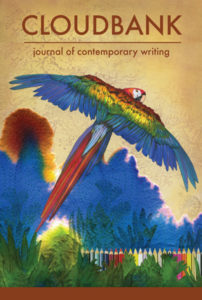 New poems from Richard Jones, Paulann Peterson, Dennis Schmitz, Alice Derry, Kay Lin, Kathleen McGookey and many others fill Cloudbank 13. Book reviews for Stranger on Earth by Richard Jones, Cloud Memoir by Christopher Buckley, and Blue Mistaken for Sky by Andrea Hollander are included.
New poems from Richard Jones, Paulann Peterson, Dennis Schmitz, Alice Derry, Kay Lin, Kathleen McGookey and many others fill Cloudbank 13. Book reviews for Stranger on Earth by Richard Jones, Cloud Memoir by Christopher Buckley, and Blue Mistaken for Sky by Andrea Hollander are included.
To order this issue click here.
PRIZE-WINNING POEM
“Bluebird” by Jane Craven
On the path behind my house the bamboo
grove is bamboozled by snow bent
to the ground in a St. Louis arc iced thick
as grandma’s layer cake the weather takes
its toll
meaning we must pay incrementally to exist
O we can still have a good time when we forget
the wearing away the constant winging upward
of cells sea oats
blown clean in the wind the revealed
structure of trees strange as a Buddha’s hand
stranger still the one winter I ended
sentient eyes last fixed
on a parchment lamp shade its ochre glow
edging me out of the room
or the other winter where I am gone before I am gone
fingers clenching sheets
like the scaled talons of a dead passerine
unable to recall the body in life’s lightest flight
a body once fooled into thinking it could drop
everything rise again in the spring
Poets and writers in Cloudbank 13
Jeffrey Alfier
David Axelrod
Milton J. Bates
P. V. Beck
Genevieve Betts
Polly Buckingham
Christopher Buckley
Mary Lou Buschi
Tetman Callis
Brad Canfield
Rita Ciresi
Dan Clark
Susan Cornford
Jane Craven
Deborah Cummins
Jim Daniels
Alice Derry
Linda Ferguson
Meg Files
Rebecca Foust
Diane Frank
Andrea Hollander
Richard Jones
Karah Kemmerly
Daniel Lassell
Lois Levinson
Kay Lin
Phyllis Mannan
Sofia Martimianakis
Kathleen McGookey
Karen McPherson
Robert Miltner
Robert Morgan
Bob Moskowitz
Linnea Nelson
Steven Ostrowski
Derek N. Otsuji
Bruce Parker
Beth Paulson
Paulann Petersen
Anne Randolph
Rush Rankin
Maya Ribault
Liz Robbins
Jenny Root
Dennis Schmitz
Jeanne Shannon
Robert Lee Thornton
Jeanne Wagner
Tom Wayman
O. Alan Weltzien
Gary Young